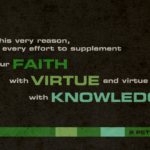
The King (Matthew 21:1–11). The people were blind to their Scriptures (Zech. 9:9). They praised Him with Psalm 118:26 but overlooked verses 22–23, which Jesus quoted later (v. 42). Beware knowing the Bible but not knowing the Lord when He is at work in your midst.
The Message
Matthew 21:6-11 NIV
6 The disciples went and did as Jesus had instructed them. 7 They brought the donkey and the colt and placed their cloaks on them for Jesus to sit on. 8 A very large crowd spread their cloaks on the road, while others cut branches from the trees and spread them on the road.
9 The crowds that went ahead of him and those that followed shouted, “Hosanna to the Son of David!” “Blessed is he who comes in the name of the Lord!” “Hosanna in the highest heaven!” 10 When Jesus entered Jerusalem, the whole city was stirred and asked, “Who is this?” The crowds answered, 11 “This is Jesus, the prophet from Nazareth in Galilee.”
- Luke 19:41-42 NIV As he approached Jerusalem and saw the city, he wept over it and said, “If you, even you, had only known on this day what would bring you peace—but now it is hidden from your eyes.
There were five crowds within the large crowd….
- The Curious CrowdThey followed Him on Palm Sunday because they wanted to know what He was going to do this time. They were curious about what was in it for them.
- The Confused Crowd The confused crowd is illustrated in Matthew 21:10-11, “When Jesus came to Jerusalem, everyone in the city was excited and asked, “Who can this be? The crowd answered, “This is Jesus, the prophet from Nazareth in Galilee.” Of all the things Jesus did, this one-line description was all they could say. Even though they were following Him, they were still confused about who Jesus was. The confused group today refers to God as “the man upstairs” or as a higher power.
- The Pretenders They were in the crowd on Palm Sunday pretending to be committed to Jesus. They were pretending, but they were not fully sold out. Pretenders go through the motion, but their hearts are lukewarm. They are great pretender just to impress others and to get their approval.
- The Opposers The fourth group included the opposers like the Pharisees and the Sadducees. For three years they had done everything they could to oppose what Jesus was doing. They rebuked Him for healing on the Sabbath and for taking an ox out the ditch. They forgot Him because His disciples ate food without washing their hands. Ultimately they conspired to have Jesus killed…
- The Committed CrowdHowever, this is the smallest group. A committed person is one who follows Jesus‘ instructions without questioning Him or His motives and without murmuring and complaining.
- Matthew 21:6-7, “The disciples left and did what Jesus had told them to do. They brought the donkey and its colt and laid some clothes on their backs.”
Reflections in All Cases
- They missed God’s timing
As Jesus ascended toward Jerusalem, a large multitude gathered around Him. This crowd understood that Jesus was the Messiah; what they did not understand was that it wasn’t time to set up the kingdom yet
- The power of the religious blinded their spiritually
In their praise of Jesus, the Jewish crowds were quoting Psalm 118:25–26, an acknowledged prophecy of the Christ. The allusion to a Messianic psalm drew resentment from the religious leaders present
- However, God’s plan was in motion
Some 450 to 500 years prior to Jesus’ arrival in Jerusalem, the prophet Zechariah had prophesied the event we now call Palm Sunday: “Rejoice greatly, Daughter Zion! / Shout, Daughter Jerusalem! / See, your king comes to you, / righteous and victorious, / lowly and riding on a donkey, / on a colt, the foal of a donkey” (Zechariah 9:9)
The people wanted their earthly objectives met at the expense of God’s eternal plans
- The crowds looked for a Messiah who would rescue them politically and free them nationally, but Jesus had come to save them spiritually. First things first, and mankind’s primary need is spiritual, not political, cultural, or national salvation.
They failed to realize God’s ways are not our ways
- They could neither see nor understand the cross. That’s why, “as [Jesus] approached Jerusalem and saw the city, he wept over it and said, ‘If you, even you, had only known on this day what would bring you peace—but now it is hidden from your eyes. The days will come upon you when your enemies . . . will not leave one stone on another, because you did not recognize the time of God’s coming to you” (Luke 19:41–47).
We worship him on Sunday then reason like the world on Monday
- It is a tragic thing to see the Savior but not recognize Him for who He is. The crowds who were crying out “Hosanna!” on Palm Sunday were crying out “Crucify Him!” later that week (Matthew 27:22–23).
We Should Remember: There is coming a day when every knee will bow and every tongue confess that Jesus Christ is Lord (Philippians 2:10–11). The worship will be real then.
- Philippians 2:10-11 NIV that at the name of Jesus every knee should bow, in heaven and on earth and under the earth, and every tongue acknowledge that Jesus Christ is Lord, to the glory of God the Father.
John records a scene in heaven that features the eternal celebration of the risen Lord: “There before me was a great multitude that no one could count, from every nation, tribe, people and language, standing before the throne and before the Lamb. They were wearing white robes and were holding palm branches in their hands”
- Revelation 7:9, emphasis added These palm-bearing saints will shout, “Salvation belongs to our God, who sits on the throne, and to the Lamb” (verse 10), and who can measure sum of their joy?
We can be in the crowd that mattersThere is good news for everyone on Palm Sunday and on other days as well. There is one crowd we all should want to be in. That’s the crowd that will be caught up with Jesus in the air when He comes back to take us home to glory.
- Romans 10:9-11 f you declare with your mouth, “Jesus is Lord,” and believe in your heart that God raised him from the dead, you will be saved. 10 For it is with your heart that you believe and are justified, and it is with your mouth that you profess your faith and are saved. 11 As Scripture says, “Anyone who believes in him will never be put to shame.”
I want to be there… How about you?






